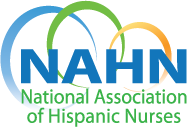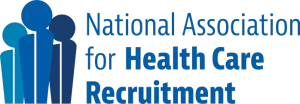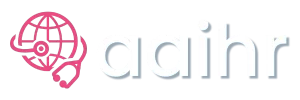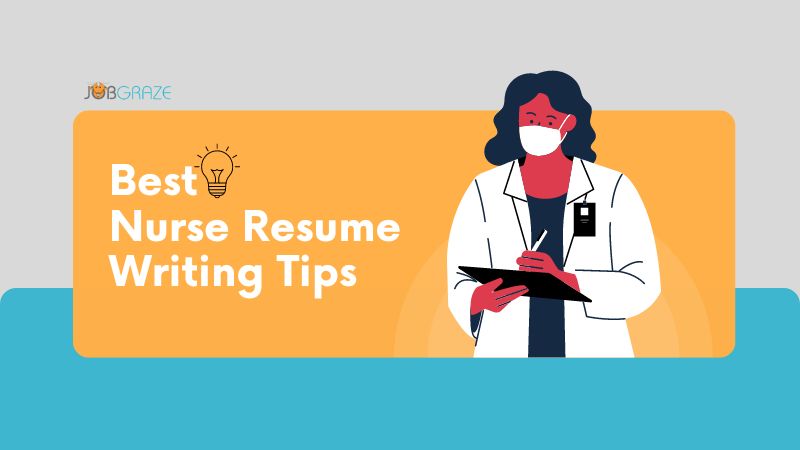
Summary: Are you searching for your dream nurse job? Your resume is the key! Get essential tips and guidelines from our experienced APRN, tailored for registered nurses, travel nurses, LPNs, and international nurses.
If you are applying for jobs in the nursing field, it is crucial to have a good resume that stands out from the other applicants. Nursing resumes must be approached differently than traditional resumes. While all resumes should be done with the same best practices for spelling, grammar, and layout, your resume should be tailored to your field to give you a better chance of earning a position.
You should think of your resume as your first introduction to a prospective employer. It must be an accurate representation of who you are as a person and as a nursing professional. Knowing how to write an effective resume for nursing positions will help you make a better first impression with employers which will increase your chance of securing a position. In this article, we will discuss important tips for writing an effective nursing resume that will help you stand out among the applicants and find an ideal nurse job.
How to Make Nursing Resume (CV) Stand Out?
Grab your computer and jot down these key points to make your nursing resume stand out:

Write an Objective Statement
Every resume should include a clear and concise objective statement to get the attention of prospective employers. In your statement, you should explain your skills and the type of work you are looking for and give a short history of your work experience. Try to avoid general statements about seeking a job opportunity in the nursing field and instead be more specific by mentioning your experience, skills, and level of commitment.
Demonstrate Your Value
Your resume is your chance to showcase your skills and value as a potential employee. Do not fall into the trap of underselling yourself. Be specific and thorough when talking about your previous experience and skills to demonstrate your value. Writing about yourself in this way also conveys confidence in your skills which can make you stand out from other applicants.
Describe your previous experiences in the medical field in detail, including how they have influenced you and how the skills you learned at those previous positions can help you succeed at the position you are applying for. Include explanations of how your technical skills and patient interaction skills developed at previous positions while talking about yourself on your objective statement and throughout your resume.
Explain Clinical Experience and Skills
Employers looking for candidates to fill nursing positions put a lot of weight on experience and skills. It is important to effectively communicate the full depth of your experience and skills to help employees accurately assess your skill level and expertise. A thorough explanation of your clinical experience and skills also shows your commitment to continuing to pursue your career in nursing.
Provide a detailed explanation of what medical facilities you have worked at, including your clinicals. You should also describe what you have gained from these experiences that have enhanced your skills and expertise.
Nursing Skills You Need on Your Resume
The following types of nursing skills should be included on your resume:
Skills relevant to the position:
Before applying for a nursing position, you should understand the position as well as the mission and values of the employer. Your resume and objective statement should be written to incorporate all of your skills that are specifically relevant to the position. For example, if the position is for an administrative nurse, include skills that are related to this position such as patient intake protocols, patient assessment and care plans, and insurance processing.
Leadership nursing skills:
You should always display your leadership skills in your resume, regardless of whether you are applying for a leadership position. Leadership skills are highly valued in nursing because they show a level of self-sufficiency and competence. You should be specific when explaining the leadership skills, you have developed and used in your nursing career. For example: For ER Nurse, expert decision making skill is an important leadership skill.
Problem solving skills:
Problem solving skills are highly valued in nursing as being able to solve problems quickly shows employers that you have good clinical judgement. It also gives employers confidence that you can make logical decisions in a crisis and solve problems yourself with minimal guidance.
Clinical nursing skills:
You should list all of your clinical nursing skills, highlighting skills that are relevant to the position you are applying for while also including additional skills even if they are not directly relevant. Showcasing all of your skills helps employers determine how much orientation you would need before you can start contributing, which helps them plan for new staff. It also helps for an employer to know all of your skills in case they need your help with something else that requires some of your skills.
Bilingual skills:
If you speak a second language, you should include this on your resume. Bilingual nurses are highly valuable when it comes to communicating with patients who do not speak English as there may not be a translator readily available to answer every question and concern. Travel and International Nurses should mention about this in their resume.
Other skills to consider adding to your nursing resume include:
- Nursing organizations that you belong to which shows that you are active in your field.
- Hospital Magnet participation shows that you are familiar with the certification process.
- Community outreach or volunteer work which shows your commitment to your community.
Describe Level of Education
Level of education is one of the most important details to put in a resume, but this should include more than just listing your degree and the school from which you earned it. You should also include details such as additional training you received while at school or at a previous position and recognition from an academic body such as graduating with honors. The more you can fill in about your education, the more you will stand out from other applicants who only list their degrees.
Check Grammar and Spelling
Resumes with excellent formatting, spelling, and grammar appear more professional than resumes that lack in these areas. Double check your resume to ensure that it has clear language, correct spelling, and good grammar and punctuation. Poor grammar and formatting can cause your resume to be looked over, no matter your skills or credentials.
It is important for the language in your objective statement and resume to be clear and concise. Make sure your resume communicates what you want to say effectively while keeping it within two pages. Unnecessary words or phrases should be removed for the sake of clarity and simplicity. Reviewing nursing resume examples can also help you ensure that you are using language that conforms to industry norms.
What Should I Avoid Doing in My Nursing CV?
When writing your nurse curriculum vitae, it is just as important to know what to avoid as it is to know and understand what to do. You must avoid the following mistakes on your nursing resume:
- Not optimizing your resume: Many employers use applicant tracking systems to find employees. These systems match the resumes that are submitted to the job descriptions of listed positions. Make sure you optimize your resume with words and phrases that match the description of the position you are applying for, or it may be ranked lower.
- Using the same resume to apply to multiple positions: If you are applying to more than one position, your resume should be unique for each specific position. The basic information will be the same but research each position and employer you are applying for and work that information into your resume. This will help you stand out more than submitting the same general resume for multiple positions.
- Forgetting a cover letter: You should always include a cover letter with your resume as this increases your chance of getting an interview. You can use your cover letter to provide additional information about yourself and your experience that may not be covered in the resume.
- Using generated text: There are resume generators out there that put resumes together with pre-formatted templates and scripted text, but these resumes are not nearly as effective as resumes you write yourself. These generators tend to use scripted language that is more general in scope and the quality of the scripted text is questionable. It is best to write your own resume suited to the specific position you are applying for.
- Leaving out details about previous healthcare employers: It is important to provide as much detail as possible about your previous nursing jobs to help potential employers get a better idea of your experience and skill level. Your resume may be passed over if it lacks these details.
- Writing poor job descriptions: Writing descriptions of your previous positions, including qualitative as well as quantitative descriptions of your skills and duties, is beneficial. Including quantifiable data can make your resume more memorable.
- Underselling yourself: As mentioned in a previous section, you should not hold back when describing your experience, skills, credentials, and accomplishments. Include every detail about your individual accomplishments, skills, and experience that can help separate you from the other applicants.
- Poor grammar and formatting: Your resume must look professional at first glance. Good formatting makes your resume look more professional and it is easier to navigate for those reviewing your resume. Clearly separate the sections of your resume and use bullet points, when necessary, instead of paragraphs. You must also check for and correct spelling and grammar errors.
What is the Best Format for Nursing Resumes?
The best way to write nursing resumes is with reverse chronological formatting. With this format, your most recent achievements, which are more relevant to potential employers, are listed at the top. Listing your achievements and skill sets in reverse chronological order gives them more context which is valuable for those reviewing your resume. With chronological formatting, skills and achievements are listed without proper context.
How Should I Display My Nursing Credentials on a Nursing Resume?
Nurses earn new credentials and certifications as their careers progress, and it is important to ensure that every credential ends up on their resume. Nursing credentials include degrees, certifications, and specializations that demonstrate the qualifications and occupational expertise of a nursing professional. These credentials must be displayed in a certain order on medical documents and patient records.
Displaying your credentials in your nursing resume shows employers your level of expertise and achievements and helps your resume stand out. Make sure you follow these tips for displaying your nursing credentials:
- Order of credentials: The American Nurses Credentialing Center (ANCC) developed the following order to list your credentials: highest earned degree as an abbreviation, licensure, state designations, national certifications, awards and honors, and additional recognitions that are not specifically nursing recognitions.
- List all credentials: As a clinician, it’s important to list all your certifications, such as Diabetes Certification and Emergency Medicine Certification. These certifications demonstrate your expertise in specific healthcare areas. By providing this information, you help patients, hospitals, and regulators understand your qualifications better. This transparency supports high standards of care and keeps you informed in your field.
- Format credentials correctly: Your credentials should be listed as abbreviations following your name. It is important to use the proper abbreviations and put them in the correct order according to the standards of the ANCC discussed above. Your name and every credential listed should be separated with a comma.
Nurse Resume Examples
Find inspiration from our nursing resume samples tailored by experienced nurses, aimed at securing your next job in 2024.
Registered Nurse Resume
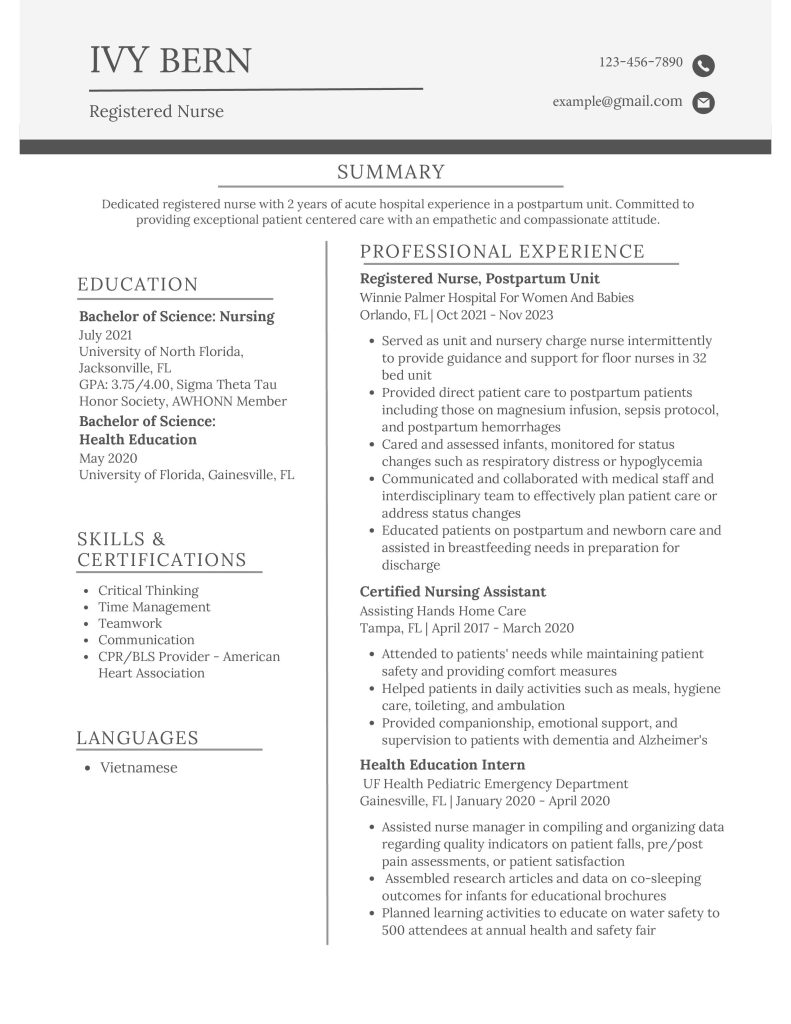
International RN Resume
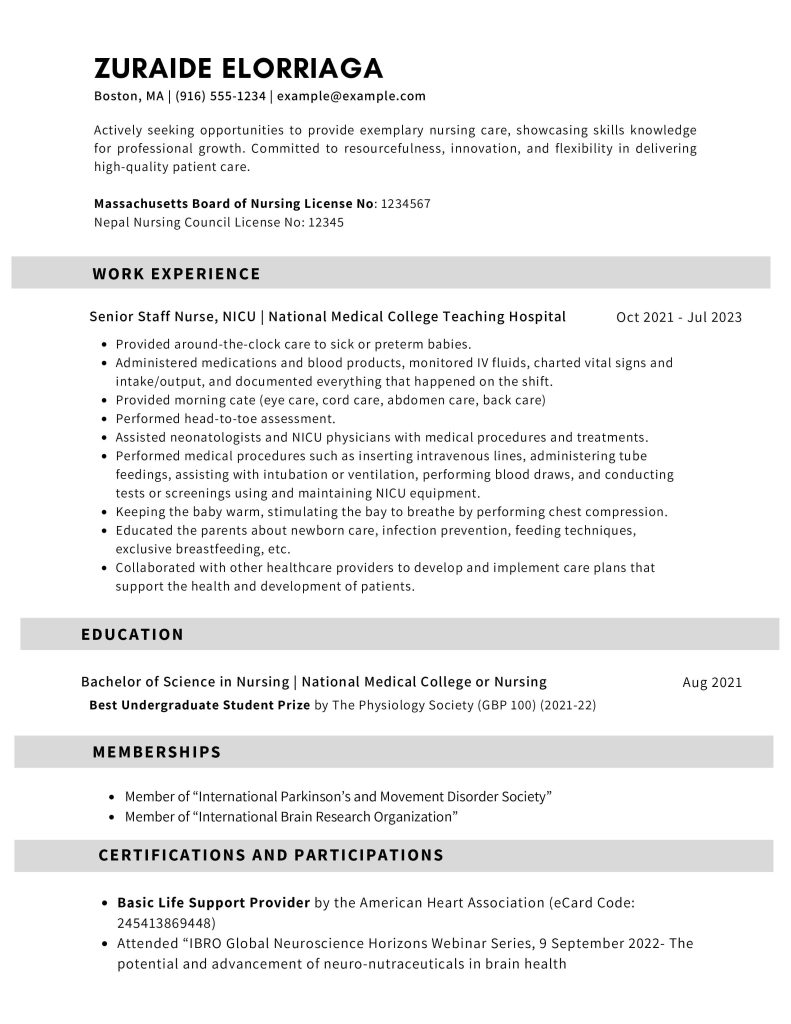
Find Nursing Jobs On JobGraze
Nursing positions can be competitive which is why it is so important to write an impressive resume. Taking the time to include information that properly showcases your skills and expertise and is tailored to the specific position you are applying for will help your resume stand out and increase your chances of landing an interview and the position. If you are ready to put your nursing resume out there and land a nursing job, you can apply through JobGraze.
JobGraze is an employment platform that helps connect healthcare providers with qualified candidates that are looking for nursing jobs. Our platform allows applicants to search for a wide variety of nursing positions and filter by job type, specialization, location, and more. Once you submit your resume for a nursing job listing, you will be notified when an employer reaches out to you. Candidates can find a variety of nursing jobs through JobGraze including LPN and RN jobs, nurse practitioner jobs, travel nurse jobs, international nurse jobs, ER nurse jobs, ICU nurse jobs, telehealth nurse jobs, and nurse educator jobs.
Sign up for JobGraze to discover how we can help you land your ideal nursing job and establish a good nursing career for you. With JobGraze, you can elevate your job search by using our AI-generated resume builder to create resumes, summaries, achievements, and cover letters, making your search even more effective.

